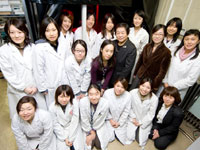Professor at Japan Women's University (Faculty of Science)
Project Leader of the Multi-career Path Support Model for Female Researchers
Member of the Science Council of Japan
Vice President of the Japan Society of Applied Physics
Country of origin: Japan What I do.
What I do.
I have been engaged in basic theory, design, and fabrication in the field of micro-optics as well as applied fields in optoelectronics. I applied special features of diffractive optical elements that include ultrafast speed and parallel processing to new devices that I developed with my graduate students. One example is our design for the high dispersion VPH grism, installed in the Subaru telescope in Hawaii. We also built a face recognition system, called FARCO, using compact optical parallel correlation. An all-optical ultrafast image search engine is being developed for criminal identification and prevention of illegal downloading of motion pictures.
What I find exciting.
By starting off as a high school teacher in physics, I only "saw the light" when I was coincidentally asked to be an assistant in a pioneering laser research laboratory. There, I had the good fortune to meet my mentor as well as great researchers of the same generation (all male). Diffractive optics amazed and still amazes me with its great scope for application, in which one's imagination can play a big role. It is an exciting moment when routine daily experiments with conscientious students (female, as it's a women's university!) lead to good results and the development of a new device.
What I wish someone had told me.
"Go global." In the 21st century, it is only natural to belong to an international research community, but I simply did not have the time, as I started my career as a physicist in my mid-thirties. I had three children and aging parents to look after. Yet things have not changed that drastically, even today. Meeting the right mentor (male or female), receiving support from your family, and creating an environment where different actors (students and researchers from industry and government) can collaborate freely are all still very important. I have been lucky enough to have had all of those.